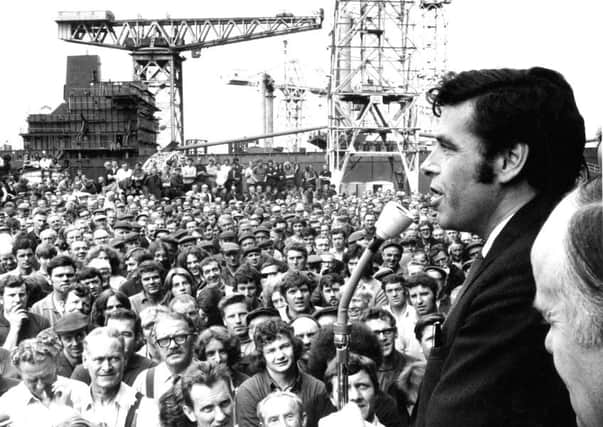Book review: Jimmy Reid, A Scottish Political Journey, by Kenny MacAskill


MacAskill gives his book the sub-title “A Scottish Political Journey”, and in one sense this is fair enough. Reid did after all move from the Communist Party to Labour before eventually, after a brief flirtation with Tommy Sheridan’s Scottish Socialist Party, arriving in the SNP. Yet one might also argue that in an important sense he was marching on the spot rather than along the road. By this I mean that essentially he didn’t change.
In his inspiring inaugural address as Rector of Glasgow University, he declared that “the rat race is for rats; we are not rats”. This address, a fine piece of rhetoric, was sufficiently impressive to be printed in full in the New York Times. This was remarkable, but the address itself was in a Scottish humanist tradition which runs from Burns to McIlvanney and (one hopes) beyond.
Advertisement
Hide AdJimmy Reid stood for parliament several times, unsuccessfully. Undoubtedly he aroused suspicion; he was independently-minded, not likely to be a good party sheep. I suspect that his celebrity, and his work as a newspaper columnist and radio and TV debater or pundit, aroused some resentment. MacAskill thinks he would have been ineffective and perhaps unhappy in parliament, and indeed it is quite likely that in the House of Commons where, unlike the Scottish Parliament, big speeches may still sometimes have an effect, Jimmy Reid would have found himself admired and cherished as a performer, one who did a “star turn” – even while his message was ignored. This had after all been Maxton’s fate, starting as a firebrand, ending as the Pet or Darling of the House.
After his early years Reid found himself attacked more often from the left than the right. His position on the Miners’ Strike of 1984 cost him many friends. Of course he supported the miners, and was opposed to the Thatcher Government’s programme of pit closures. Of course he supported the right to strike. But he was severely critical of the Miners’ leaders, Arthur Scargill and Mick McGahey, and in particular of their refusal to ballot their members. A successful ballot would not only have made the strike legal; it would also have ensured that it remained an industrial dispute, and therefore capable of being settled by negotiation.
Some thought that by taking this line Reid was betraying the working class; yet the outcome of the strike was disastrous for the miners, and it was their leaders who had betrayed them by marching them up a blind alley.
MacAskill has written a fair and fluent biography, agreeable to read, and promoting reflection. It’s not a hagiography, for he isn’t blind to Reid’s faults. Yet it would be wrong to see it as the case for the defence, and not only because I don’t think Jimmy Reid is in any need of being defended. He was a good man, better perhaps than most who venture into public life, and if he came to enjoy his celebrity and was not free of vanity, that could be said of most who spend years in the public eye.
He was a serious man about serious matters, but he could laugh at himself and that is a saving grace.
I remember coming upon him in the Murrayfield car-park before an international. He was happily smoking a Churchill-sized Havana. “Still doing your bit for the Cuban economy, Jimmy?”
Advertisement
Hide Ad“Can’t leave that work to the capitalists, Allan.” Our former Justice Minister has done justice to a remarkable Scot.
Jimmy Reid, A Scottish Political Journey, by Kenny MacAskill, Biteback, 356pp, £10